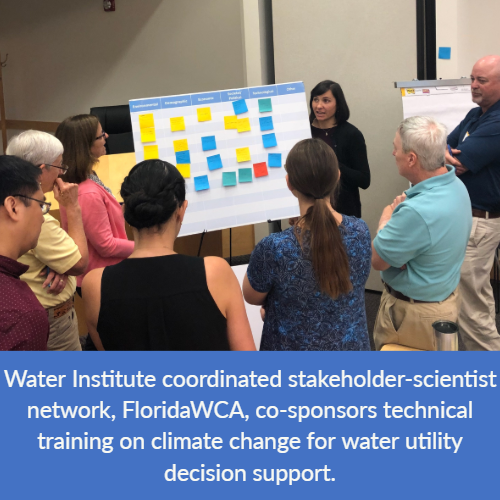Last week, the Florida Water and Climate Alliance (FloridaWCA), a stakeholder-scientist network coordinated by the UF Water Institute, co-sponsored the training “Building Resilience to a Changing Climate: A Technical Training in Water Utility Decision Support” in collaboration with the Water Utility Climate Alliance (WUCA). During this full two-day free training over 45 participants, comprising drinking water, stormwater and wastewater utility managers, staff and consultants, expanded their knowledge and practical skills to integrate climate science into all aspects of water sector utility planning. Tampa Bay Water, a leading organization in both FloridaWCA and WUCA, hosted the training and made the event possible by bringing the sponsoring organizations together.
The training focused on important dimensions of building the resilience of water sector utilities, including creating a common vocabulary and understanding of climate science and practices so practitioners and consultants are able to effectively work together. With a dynamic agenda that included plenary speakers and interactive group activities the workshop topics included climate science and modeling, planning under uncertainty and scenario design. An important focus of the workshop was enhancing participant’s communication skills for relaying this information and better engage audiences as well as addressing institutional barriers.
“It was an exciting opportunity for FloridaWCA, WUCA and the many participants,” said Lisette Staal, UF Water Institute/FloridaWCA. “It provided an opportunity to bring the unique climate challenges and locally relevant research in Florida and the Southeast, to the well-established national training program.”
During the workshop, Water Institute Director Wendy Graham presented a case study in the Tampa Bay Region that highlights the challenge and limitation of downscaling approaches in Florida and the Southeast, efforts to overcome those limitations, and an application case study using Integrated Hydrologic Modeling for climate change impact assessment.
You can learn more about the workshop agenda and trainees here.
To learn more about the Florida Water and Climate Alliance (FloridaWCA) visit their webpage.


